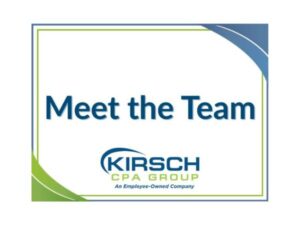Manufacturers: If Available, Take Advantage of Sales Tax Exemptions
Kirsch CPA Group
Jun 23, 2025

Manufacturers must comply with all relevant tax laws to avoid dire consequences. While the most attention is generally directed toward federal income and payroll taxes, there’s another potential aspect to consider: state sales tax.
The good news is that manufacturers may be able to take advantage of various sales tax exemptions. For example, many states offer exemptions for items used in the manufacturing process, such as machinery, equipment and supplies. The result? Tax savings for your manufacturing company.
Definition of “Manufacturing” Counts
How does your company’s home state define the term “manufacturing”? More often than you might think, the state’s interpretation differs from a traditional view. Notably, some states include nontraditional processes in their definition of “manufacturing” for exemption purposes while others may allow some leeway in the determination of when manufacturing “begins” and when it “ends.”
Kirsch CPA Group can provide insights into the regulations affecting exemptions in your state. While the details can vary state-to-state, here are four “out-of-the-norm” situations where a manufacturing exemption may be available.
- In Florida, a printer may be labeled as an eligible manufacturing business.
- In Texas, a restaurant, a bakery in a grocery store and even a caterer may qualify for a manufacturing exemption on equipment purchases.
- In Maine, tax regulations include certain biological processes in their definition of “production” for purposes of the state’s sales tax exemption.
- In Kentucky, the state has authorized an exemption for electricity used or consumed in the commercial mining of cryptocurrency.
The lesson here is to not be so quick to dismiss the possibility of a manufacturing sales tax exemption for your company.
Determining What Falls Under an Exemption
On the other side of the coin, some items used by manufacturers, or parts of items, may not qualify for an exemption if they fail to meet state law requirements. Generally, the determination boils down to either one of two applications:
- Machinery and equipment that’s “necessary and integral” to the manufacturing process, or
- Machinery and equipment that’s used directly in making a change to the physical product.
The outcome isn’t always clear at the outset. Here are a few areas that often come under scrutiny:
Production supplies. The exemption for production supplies generally is a broad one. Note, however, that a smattering of states, including California, don’t have one. In some states exemptions are available only for production supplies that come in direct contact with the manufactured product, while others provide exemptions for supplies exhausted in the manufacturing process. In still other states, the supplies must be necessary and integral to the manufacturing process. For states in the middle ground, the exemption may require the production supplies to come in direct contact with the manufactured product.
Storage and handling. Generally, the storage of raw materials or finished products is treated as a taxable part of the manufacturing process. Some states allow an exemption for storage racks if they’re used during the manufacturing process. In addition, machinery used in handling items for storage may qualify for an exemption.
Safety apparel. Absent a specific exemption allowed by the state, safety apparel worn by employees is subject to tax. Nevertheless, certain states offer an exemption, including North Carolina, where the apparel is exempt if it protects the product, but not the employee. Other states, including Georgia, allow an exemption where safety apparel is necessary and integral to the manufacturing process.
Maintenance and repairs. Manufacturers frequently have to make repairs or perform upkeep on machinery, equipment or supplies. Many states offer exemptions for repair parts. But they’re not automatic. In some cases, maintenance equipment and supplies may be taxable in your state, depending on the wording of the applicable exemption.
Janitorial supplies. Generally, janitorial supplies used to clean the administrative offices of a manufacturing plant are taxable and aren’t eligible for an exemption. However, supplies used to clean the manufacturing machinery, or areas close to manufacturing operations, may qualify for an exemption in certain states. For instance, a manufacturer can claim an exemption in South Carolina for supplies used to clean a manufacturing machine if the cleaning is integral and necessary to the manufacturing process as part of a continuous activity.
Seek Expert Help
Many variables exist in determining whether a manufacturer can take advantage of sales tax exemptions. To better ensure you’re not missing a tax-saving opportunity, please contact Kirsch CPA Group.
We can help you tackle business challenges like these – schedule an appointment today.
© Copyright 2023. All rights reserved.
More Resources

About The Author
Kirsch CPA Group is a full service CPA and business advisory firm helping businesses and organizations with accounting,…





